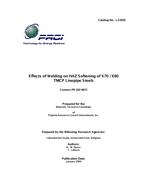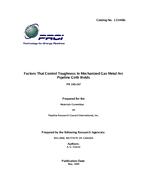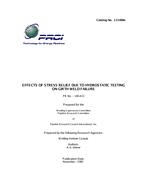Provide PDF Format
PRCI PR-202-9635
- Effects of Welding on HAZ Softening of X70 / X80 TMCP Linepipe Steels
- Report / Survey by Pipeline Research Council International, 01/01/2000
- Publisher: PRCI
$448.00$895.00
L51926e
University of Gent (BWI)
Need: Developments in controlled rolling and accelerated (water) cooling techniques in plate mills in the early 1980's have made it possible to produce micro-alloyed high strength line pipe steels with very low carbon contents (C < 0.05 %). The lean chemistry of these high strength TMCP steels provides moderate hardenability, excellent weldability and adequate low temperature heat affected zone (HAZ) toughness. However, the lean chemistry and, in particular, the low C content, requires carefully controlled welding procedures to achieve adequate strength in the weld HAZ. It is essential, therefore, to characterize the hardness, strength (and toughness) properties of the variety of microstructures occurring in the HAZ of lean alloyed high strength line pipe steels. More specifically, a better understanding of the parameters affecting the strength and hardness properties of low alloy TMCP pipeline steels subjected to welding is required. The mean parameters contributing to HAZ softening are: steel chemistry, plate and pipe manufacturing route, weld heat input (including the effects of preheat and interpass temperature) and the number of weld cycles.
Result: Experimental work was done to evaluate the effects of welding on the hardness, tensile and toughness properties of the heat affected zone (HAZ) of a series of commercial high strength micro-alloyed linepipe steels, produced through controlled rolling and accelerated cooling (thermo-mechanical control process - TMCP). The test materials, representative of modern low carbon linepipe steels, were selected such as to cover a broad range of chemistries (alloy /micro-alloy designs) and mechanical properties (X 70 and X 80).
Benefit: Special emphasis was placed on verifying the susceptibility of the steels to the occurrence of(yield strength) softening in the weld HAZ and on characterizing the toughness properties of the grain coarsened HAZ. This objective was achieved by means of the weld thermal simulation technique. By the application of thermal cycles representative of those occurring in the HAZ of pipeline girth welds made with moderate to high heat inputs, a broad range of HAZ micro-structures covering the complete weld HAZ were synthetically (artificially) produced in each of the steels. The properties of these well-defined microstructures were subsequently determined by optical metallography, hardness, tensile and Charpy V impact testing.
University of Gent (BWI)
Need: Developments in controlled rolling and accelerated (water) cooling techniques in plate mills in the early 1980's have made it possible to produce micro-alloyed high strength line pipe steels with very low carbon contents (C < 0.05 %). The lean chemistry of these high strength TMCP steels provides moderate hardenability, excellent weldability and adequate low temperature heat affected zone (HAZ) toughness. However, the lean chemistry and, in particular, the low C content, requires carefully controlled welding procedures to achieve adequate strength in the weld HAZ. It is essential, therefore, to characterize the hardness, strength (and toughness) properties of the variety of microstructures occurring in the HAZ of lean alloyed high strength line pipe steels. More specifically, a better understanding of the parameters affecting the strength and hardness properties of low alloy TMCP pipeline steels subjected to welding is required. The mean parameters contributing to HAZ softening are: steel chemistry, plate and pipe manufacturing route, weld heat input (including the effects of preheat and interpass temperature) and the number of weld cycles.
Result: Experimental work was done to evaluate the effects of welding on the hardness, tensile and toughness properties of the heat affected zone (HAZ) of a series of commercial high strength micro-alloyed linepipe steels, produced through controlled rolling and accelerated cooling (thermo-mechanical control process - TMCP). The test materials, representative of modern low carbon linepipe steels, were selected such as to cover a broad range of chemistries (alloy /micro-alloy designs) and mechanical properties (X 70 and X 80).
Benefit: Special emphasis was placed on verifying the susceptibility of the steels to the occurrence of(yield strength) softening in the weld HAZ and on characterizing the toughness properties of the grain coarsened HAZ. This objective was achieved by means of the weld thermal simulation technique. By the application of thermal cycles representative of those occurring in the HAZ of pipeline girth welds made with moderate to high heat inputs, a broad range of HAZ micro-structures covering the complete weld HAZ were synthetically (artificially) produced in each of the steels. The properties of these well-defined microstructures were subsequently determined by optical metallography, hardness, tensile and Charpy V impact testing.
Related Products
PRCI PR-140-147
Factors That Control Toughness In Mechanized Gas Metal Arc Pipeline Girth Welds..
$198.00 $395.00
PRCI PR-140-413
Effects of Stress Relief Due to Hydrostatic Testing on Girth Weld Failure..
$98.00 $195.00





